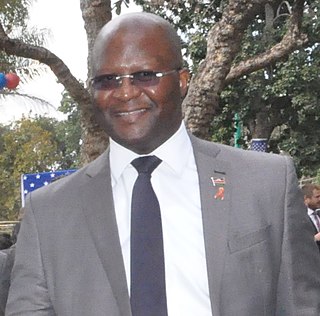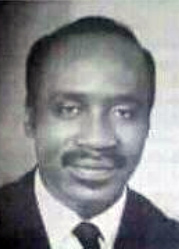Related Research Articles

Hastings Kamuzu Banda was the leader of Malawi from 1964 to 1994. He served as Prime Minister from independence in 1964 to 1966, when Malawi was a Dominion / Commonwealth realm. In 1966, the country became a republic and he became the first president as a result, ruling until his defeat in 1994.

Elson Bakili Muluzi is a Malawian politician who was President of Malawi from 1994 to 2004. He was also chairman of the United Democratic Front (UDF) until 2009. He succeeded Hastings Kamuzu Banda as Malawi's president. He also served in Banda's cabinet as minister without portfolio, before retiring in 1980.

General elections were held in Malawi on 20 May 2004 to elect a President and the National Assembly. The election had originally been scheduled for 18 May but was postponed for two days in response to opposition complaints of irregularities in the voter roll. By 22 May no results had been announced, leading to protests from the opposition and threats of disorder. On 25 May the Malawi Electoral Commission finally announced the results of the election. Bingu wa Mutharika, the candidate of the ruling United Democratic Front, was declared the winner of the presidential poll, whilst the Malawi Congress Party had won most seats in the National Assembly vote. Voter turnout was around 62%.

Brown James Mpinganjira, popularly known as BJ is a Malawian Politician who used his 1986 detention to fight the injustices of the then one party state. He worked with others in prison and used their time to devise ways on how to change the direction of Malawi's political state.

John Zenus Ungapake Tembo was a Malawian politician who served for years as President of the Malawi Congress Party (MCP). Tembo comes from the Dedza District in central Malawi, and he was a teacher by profession. Beginning in the 1960s he was an important politician in Malawi, and he was a key figure in the regime of Hastings Banda (1964–1994). He has been variously described as "physically slight, ascetic, fastidious" and "cunning". He was replaced as President of the MCP in August 2013.

Gwandaguluwe "Gwanda" Chakuamba Phiri was a Malawian politician who was the leader of the New Republican Party (NRP). He hailed from Nsanje, a district on the southern part of Malawi. Gwanda Chakuamba attended Zomba Catholic Secondary School, a 2 year metriculation at Sulosi College in Bulawayo Zimbabwe before proceeding to the US to study law though not much is known about whether he did a degree program or a short course.
Emmie Takomana Chanika was a Malawian human rights activist.
Jack Mapanje is a Malawian writer and poet. He was the head of English at the Chancellor College, the main campus of the University of Malawi before being imprisoned in 1987 for his collection Of Chameleons and Gods, which indirectly criticized the administration of President Hastings Banda. He was released in 1991 and emigrated to the UK, where he worked as a teacher.
Zimani David Kadzamira is a Malawian academic, civil servant and diplomat. He was the Vice-Chancellor of the University of Malawi until 2009.

Justin Chimera Malewezi was a Malawian politician and a Member of Parliament for Ntchisi North in the Central Region of Malawi. He was Vice-President of Malawi from 1994 to 2004. Malewezi quit the United Democratic Front in 2004 and eventually represented the People's Progressive Movement in the 2004 general election, in which he garnered 2.5% of the total national vote.

General elections were held in Malawi on 19 May 2009. Incumbent President Bingu wa Mutharika ran for re-election; his main opponent was John Tembo, the president of the Malawi Congress Party (MCP). Five other candidates also ran. The election was won by Mutharika, who was re-elected to the Presidency with around two-thirds of the vote. Mutharika's DPP also won a strong parliamentary majority.

Atupele Muluzi is a Malawian politician, businessman and was a Member of Parliament for Machinga North East constituency from 2004 until May 27, 2019. He is also the President of the United Democratic Front and was a presidential candidate during the 2019 election. He was a running mate in the 2020 presidential elections, on a coalition ticket with incumbent President Peter Mutharika of the Democratic Progressive Party. Muluzi was Minister of Natural Resources, Energy and Mining from 2014 to 2015 and the only opposition member to serve in the Mutharika administration. Subsequently, he served as Minister of Home Affairs and Internal Security in 2015, and then Minister of Lands, Housing and Urban Development in 2015. He is the son of the former president Bakili Muluzi.

Nancy Gladys Tembo is a Malawian politician and serves as Minister of Foreign Affairs in the Malawi Government since 2022. She is also a Member of Parliament (MP) representing Lilongwe City South West constituency in the National Assembly of the Republic of Malawi.
John Tembo Jr is a Malawian diplomat. He is the Deputy High Commissioner from Malawi to the U.K. He worked at the foreign service in Japan, Belgium and England.

Dick Matenje was a former Malawian politician and cabinet minister. He was the secretary-general of the Malawi Congress Party. He was one of the 'Mwanza Four' who mysteriously died during the Kamuzu Banda regime.
Twaibumohamedi John Twaibu Sangala was a Malawian cabinet Minister and one of the Mwanza four. He was from Dedza district Traditional Authority Tambala. The function was organised by the then ruling party UNITED DEMOCRATIC FRONT (UDF) under the leadership of Bakili Muluzi, the first democratically elected president in Malawi He was the Minister of Health for Malawi. He died in a mysterious death on 18 May 1983 together with two other cabinet ministers Aaron Gadama and Dick Matenje– and Member of Parliament David Chiwanga. Their deaths were ruled as a 'traffic accident' by the Kamuzu Banda regime.

Albert Andrew Muwalo Gandale Nqumayo was a prominent politician in Malawi from the 1960s until he was sacked in 1976 and was executed in 1977. He entered politics in the mid 1950s through involvement in a hospital worker's trade union and membership of the Nyasaland African Congress, where his activities led to his detention without trial during the 1959 State of Emergency in Nyasaland. After his release, he joined the Malawi Congress Party (MCP), and became locally prominent in Ntcheu District as district MCP chairman and from 1962 as Member of Parliament for Ntcheu South. In 1963, he became Administrative Secretary of the MCP, and he was a prominent supporter of the then-Prime Minister, Hastings Banda during the Cabinet Crisis of 1964. Muwalo was rewarded for his loyalty with the cabinet post of Minister of Information in 1964, and in 1966 he became Minister of State in the President's Office. His close contact with Banda, both as minister in Banda's office and in the MCP gave him great power and, during the first half of the 1970s he and his relative, the Head of the Police Special Branch Focus Gwede, were heavily involved in the political repression of actual or suspected opponents of the Banda regime. In 1976 he and Gwede were arrested: the reasons for their arrests were unclear, but may have resulted from a power struggle among those around the ageing president or simply because he became too powerful and may have been seen by Banda as a threat. In 1977, the two were tried before a Traditional Court and after a trial whose fairness was in serious doubt, were both sentenced to death. Gwede was reprieved, but Muwalo was hanged on 3 September 1977.
Capital punishment in Malawi is a legal punishment for certain crimes. The country abolished the death penalty following a Malawian Supreme Court ruling in 2021, but it was soon reinstated. However, the country is currently under a death penalty moratorium, which has been in place since the latest execution in 1992.
Hastings Banda, the first President of Malawi, died on 25 November 1997 in Johannesburg, South Africa. Thousands of Malawians gathered in Lilongwe to bury the president. The funeral took over four hours at the State House followed by a speech of the president, Bakili Muluzi. Muluzi's speech was accompanied by religious ceremonies attended by African heads of states, notably President of Zimbabwe, Robert Mugabe, with his vice-president, Joshua Nkomo, and Botswanan President Quett Masire. In his eulogy, Muluzi said that sorrows had surrounded the country as it had lost one of the most powerful leaders in its history. Tananga Cecilia Kadzamira, Banda's long-time companion, among other relatives were the first to lay their wreaths on the president's grave. Banda was given different heroic names such as the Conqueror, and the Messiah.
References
- ↑ "Citizens for Justice, "The state of rule of law in Malawi"" (PDF). Websites.inets.info. Retrieved 19 December 2018.
- 1 2 "Protesting Politics of "Death and Darkness" in Malawi, Reuben Makayiko Chirambo". Journal of Folklore Research, Vol. 38, No. 3 (Sep - Dec 2001). pp. 205–227.
- ↑ "Malawi's Ex-Dictator, Aides Acquitted of Ordering 4 Politicians' Murders". LA Times. December 24, 1995.
- ↑ "MCP Used, Killed McWilliam Lunguzi. Now After Her Daughter Juliana:Removes Her In NEC, MP' Forum". Malawi-independent.com. 17 January 2018. Retrieved 19 December 2018.
- ↑ "Malawi News Online". Africa.upenn.edu. July 14, 1996. Retrieved 19 December 2018.
- ↑ "Over 50 years down the road: Is once 'mighty' Malawi Congress Party now a mere income generating racket for aged JZU?". Malawi Nyasa Times. 25 April 2013. Retrieved 19 December 2018.
- ↑ "Malawi News Online (15) - 09/06/96". Archived from the original on 2013-01-06. Retrieved 2013-01-06.
- ↑ "African Library: And crocodiles are hungry at night by Jack Mapanje". LitNet.co.za. 25 August 2017. Retrieved 19 December 2018.